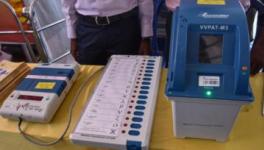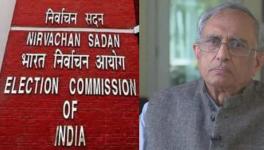Electoral Bonds: Experts Scoff at Modi Govt’s Claims of Transparency in Political Funding
Last week, in response to a petition filed by the Communist Party of India (Marxist) General Secretary Sitaram Yechury before the Supreme Court, the BJP-led central government said in a sworn affidavit that the decision to issue electoral bonds would promote transparency in funding and donations received by political parties.
Electoral Bonds were introduced after changes in the Finance Act 2017; there was related amendments in the Income Tax Act, the RBI Act, and the Representation of People Act. Even foreign companies can buy electoral bonds. In its petition, the CPI(M) claimed that the non-disclosure clause would add to the woes of Indian democracy. A bench headed by the then Chief Justice Dipak Misra issued notice to the government in the case in October last year.
The Centre denied allegations that the amendments and subsequent notification seek to create an anonymous and secretive mechanism for increasing the wealth of political parties or bring in unreasonable restriction on the freedom of information regarding identities of the contributors. Electoral bonds have been introduced to enhance accountability, it said.
Keeping the identity of the buyers of bonds anonymous was an extension of their right to vote in a secret ballot, the Centre asserted. “It is submitted that the right of the buyer to purchase bonds without having to disclose his preference of political party is in furtherance of his right to privacy,” the affidavit said.
The BJP was the biggest beneficiary of the electoral bond scheme in 2017-18, receiving bonds worth Rs. 210 crore of the Rs 215 crore issued. As per the audit and income tax reports submitted by the party to the election commission, it earned ~210 crore through electoral bonds, while the Congress, which earned ~199 crore as income in 2017-18, got only Rs. 5 crore in donations from electoral bonds. When the bonds were announced in 2017, the election commission differed with the Centre’s view that their introduction would make the process transparent. The poll panel found the mode of donation to political parties opaque.
On January 2, amid much fanfare, Arun Jaitley notified electoral bonds as a new mechanism for the funding of political parties. In his speech in the Parliament, Jaitley claimed that these bonds, which he had announced in the Union Budget last year, would usher in remarkable transparency in political funding.
However, electoral reforms activists, former chief election commissioners, and constitutional experts have slammed this move for obfuscating transparency rather then enhancing it. It would make political funding, especially by corporations, more opaque, and by giving the government and ruling party the wherewithal to find out the identity of donors, violates the cardinal principle of free and fair elections, they have said.
Electoral Bonds and the Cloud of Secrecy
An electoral bond is an interest-free instrument in the nature of a promissory note, which can be purchased for any value, in multiples of Rs 1,000, Rs 10,000, Rs 1 lakh, Rs 10 lakhs and Rs 1 crore from specified branches of the State Bank of India (SBI). Any citizen of India or a body incorporated in India will be eligible to purchase these bonds, which can be purchased once KYC (Know Your Customer) norms of SBI are fulfilled and the payment is made from a registered bank account. Having a validity of 15 days, these bonds will be available for purchase for a period of 10 days in January, April, July and October and an additional period of 30 days that will be notified by the government during general elections.
As a funding mechanism, electoral bonds are unique to India. Unlike in mature democracies like the United States, Britain, Sweden and some other countries where individuals or corporations donating to political parties must disclose their identity to the general public, electoral bonds in India allow donors a relative degree of anonymity, in order to protect them from “adverse consequences” (in Jaitley’s words.) According to Section 29C of the Representation of the People Act, political parties have to declare donations above Rs 20,000 to the Election Commission (EC). However, by Clauses 135 and 136 of the Finance Bill 2017, electoral bonds have been kept outside the purview of this provision. Therefore, parties will not have to submit records of electoral bonds received to the EC for scrutiny. Right to Information (RTI) activist Venkatesh Nayak has termed this step as a “leap backward to the era of secrecy.”
Bishwajit Bhattacharya, a former additional solicitor general of India, wrote last year when the idea of electoral bonds was first mooted :
“It is true that businesses and their associations and federations do not want the donors named but then the transparency of a system cannot be achieved when donations have no upper limits and names of groups making the payment are blacked out. Why are the donors shying away from maintaining transparency? Why should the State kneel down before them? And, what are the “adverse consequences” that the finance minister alludes to?”
Also read: The Election Commission's Concerns About Electoral Bonds Fall on Deaf Ears
The Bill also exempted electoral bonds from Section 13T of the Income Tax Act, according to which parties need to maintain and make public records of names, addresses of all donors who contribute more than Rs 20,000. It also removed the cap on political funding by corporations- earlier, by virtue of Section 182 of the Companies Act, corporations could give only 7.5% of their average net profit of the last three years to political parties; now that limit has been removed; corporations can donate as much as they want to, without any restrictions whatsoever. Milan Vasihnav, a senior fellow at the Carnegie Endowment for International Peace and author of “When Crime Pays: Money and Muscle in Indian Politics”, has criticised the BJP-led government’s Finance Bill for its cynicism towards real transparency in political funding, and following in the footsteps of the Congress party which bent all rules to avoid public scrutiny of where it was getting its money from.
Criticism Pours In
This wide leeway to corporates has drawn the ire of Jagdeep Chhokar, founder-member of the Delhi-based civil rights organisation Association of Democratic Reforms and a long-time crusader for electoral reforms. Chhokar, on whose petition in a Public Interest Litigation against the manner in which the Finance Bill unduly favoured corporations in political funding, the Supreme Court has issued notice to the central government and Election Commission. Chhokhar insists that the government at the Centre is “hoodwinking the public and electorate”, because although political parties would have to show the amount of political funding in their balance sheet, they do not have to disclose to which party they have donated.
If the donation is made to the ruling government, the electorate would have no way of knowing the extent of crony capitalism, because the party in power would obviously “reward” major and significant donors with government contracts, licenses and tenders. Moreover, the government in power would get detailed information on which corporation has donated what amount, and can thus armtwist those who have funded its rivals more, he said.
S Y Quraishi, a former chief election commissioner echoes Chhokhar. He agrees about the apprehension of potential armtwisting by the powers-that-be. He says that the electoral bonds are the exact antithesis of transparency. The bonds will ensure the anonymity of donors, but “also kill whatever little transparency that exists now.” He said, “The removal of the ceiling of 7.5% of a company’s profits that could be donated has compounded the problem. Very soon we will see companies spending all their profits on politics alone and control governments. So far, all donations above Rs 20,000 are disclosed by political parties to the Election Commission. In future, no one will know which corporation donated how much and to which party. And the inevitable quid pro quo will never be apparent.” While praising the government for taking steps to weed out black money from the electoral funding process (by insisting on bank payments), he remained unclear about corporations establishing shell companies to anonymously fund political parties, thus bringing black money back into the fray.
Nasim Zaidi, ex-chief election commissioner who retired in July last year, has also voiced his misgivings about the government not consulting the EC before introducing electoral bonds though that was mandated by law, and also stated that because of electoral bonds, corporations would never file the donations they made to political parties, thereby trampling on the people’s fundamental right to know.
Subhash C. Kashyap, former secretary general of Lok Sabha and a constitutional law expert said that the government’s latest move would not stand legal scrutiny if challenged in court. This is because the method of funding through electoral bonds defeats the provisions of the Right to Information and militates against the principle of “free and fair elections”, which is a part of the immutable basic structure of the constitution. He is of the firm opinion that the government ought to take concrete steps towards curbing the humongous expenditure that candidates and parties have to incur in order to contest elections, instead of resorting to electoral bonds, which is only an “eyewash” in the name of transparency.
Legal scholar Gautam Bhatia has explained why these bonds are a threat to democracy , while Suhrith Parthasarathy, a lawyer practising in the Madras High Court, has detailed how they reward corruption.
As of now, only sketchy details of the government’s scheme on electoral bonds are available in the public domain. But as more details will hopefully be published in the coming weeks, the question is: would the mounting criticism force the government to have a rethink?
Get the latest reports & analysis with people's perspective on Protests, movements & deep analytical videos, discussions of the current affairs in your Telegram app. Subscribe to NewsClick's Telegram channel & get Real-Time updates on stories, as they get published on our website.
























